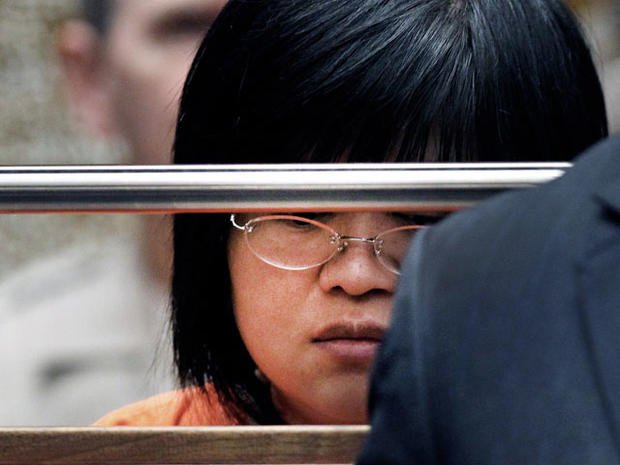Doctors and Drugs: Is it murder when a patient ODs?
(CBS) - On Friday in Los Angeles, former-doctor Hsiu-Ying "Lisa" Tseng will be arraigned on three counts of second-degree murder in the deaths of three of her patients who overdosed on drugs she'd prescribed.
According to District Attorney Steve Cooley, Tseng's case is a first for Los Angeles County - but around the country, as drug deaths have surpassed car accidents as the number one cause of unnatural death for Americans, more prosecutors are taking this step.
"We think it sends the right message to medical practitioners who use their license as a doctor to act as a drug dealer," Cooley told Crimesider.
The Associated Press reports that according to a DEA affidavit, Tseng wrote more than 27,000 prescriptions over a three-year period starting in January 2007 - an average of 25 a day.
In Ohio, a state ravaged by prescription drug abuse, Assistant U.S. Attorney Timothy Oakley says that going after doctors who run so-called "pill mills," where patients can obtain large quantities of painkillers and other drugs with little or no medical examination, has become a priority for his office.
And so far, they've had success: Last year, an Ohio jury convicted former-doctor Paul Volkman on four counts of illegal drug distribution that resulted in death. According to the sentencing memorandum prepared by the U.S. Attorney's office, "For almost three years, Volkman gave hundreds of pills to anyone who paid the cash necessary to get in the door and swore that they were not a member of law enforcement... during the course of this conspiracy, Volkman was the top physician purchaser of oxycodone in the country."
In February, Volkman received four life sentences for his crimes.
Currently, two South Florida doctors are under indictment for first-degree murder for the deaths of patients to whom they dispensed prescription drugs. According to the criminal complaint, Dr. Sergio Rodriguez killed three people "through the unlawful prescription of a controlled substance, Oxycodone, by means of a prescription issued in bad faith and not in the course of his professional practice."
And last August, Dr. Gerald Klein was charged with first degree murder in the death of Joseph Bartolucci, who, according to the state attorney's office obtained prescriptions for more than 200 pills from Klein's clinic in Feb. 2009, including 150 hydromorphone and 30 Xanax tablets; he died the next day of combined drug toxicity. Klein's co-defendants, the clinic owner and manager, have both pleaded guilty to second-degree murder. Klein is due back in court in July.
Florida State's Attorney Michael McAuliffe told Crimesider in an email that these guilty pleas represent the first time an American "pill mill" owner has been successfully prosecuted for murder. His office calls the effort to crack down on these clinics "Operation: Prescription for Death."
For years, prosecutors have had success charging doctors with negligence and involuntary manslaughter when their care of a person is deemed irresponsible. In January, a Los Angeles jury convicted Michael Jackson's doctor, Conrad Murray, of involuntary manslaughter for injecting the pop star with a sleep-inducing drug normally used only in hospital settings. Murray was sentenced to four years in jail.
But it's a long way from involuntary manslaughter - which implies no malice, or conscious disregard for life - to first- or second-degree murder. In the Tseng case, Cooley says he will argue the legal theory of "applied malice" - which says that someone who knows their actions are so reckless that there is a high potential for death, can be held criminally responsible for that death.
Colorado-based attorney Lisa Wayne says that such charges seem to her a legal overreach.
"In my opinion it overlooks the fact of the individual taking responsibility for actually taking the drugs," says Wayne, who is the president of the National Association of Criminal Defense Lawyers. "I think there are far better ways to go after doctors who violate the standard of care than to criminally prosecute them."
Wayne points to civil litigation, which has long been an avenue of recourse for people who believe they have been treated negligently by a physician. And outside of court, there are options as well, like taking away a doctor's license to practice medicine.
Diane Hoffman, a professor of law at the University of Maryland who has written about physicians charged in patient deaths, says she worries that charges like those in the Tseng case will have a "chilling effect" on doctors' willingness to treat patients with chronic pain.
"Doctors should believe their patients and not be put in a position where they're trying to scrutinize them," says Hoffman. "Are you prescribing within the standard of practice? That's a medical question. And it seems the DEA and prosecutors are looking to physicians to be enforcers of the law rather than (being) doctors."
James Tierney, a professor at Columbia University and the director of the National State Attorneys General Project, says he understands - to some degree - why law enforcement is using murder charges to try and make a dent in the major, and by many accounts, growing, public health problem of prescription drug abuse.
"The current opioid problem is like a sinking ship with 40 holes in it," he says. "The effort to use criminal law to is an effort to plug some of those holes."
Tierney, Hoffman and Wayne all say that while some particularly egregious examples of doctors using their licenses to irresponsibly dole out drugs for money may be worthy of prosecution, the practice will do little to put a dent in the health care crisis that is prescription drug abuse.
